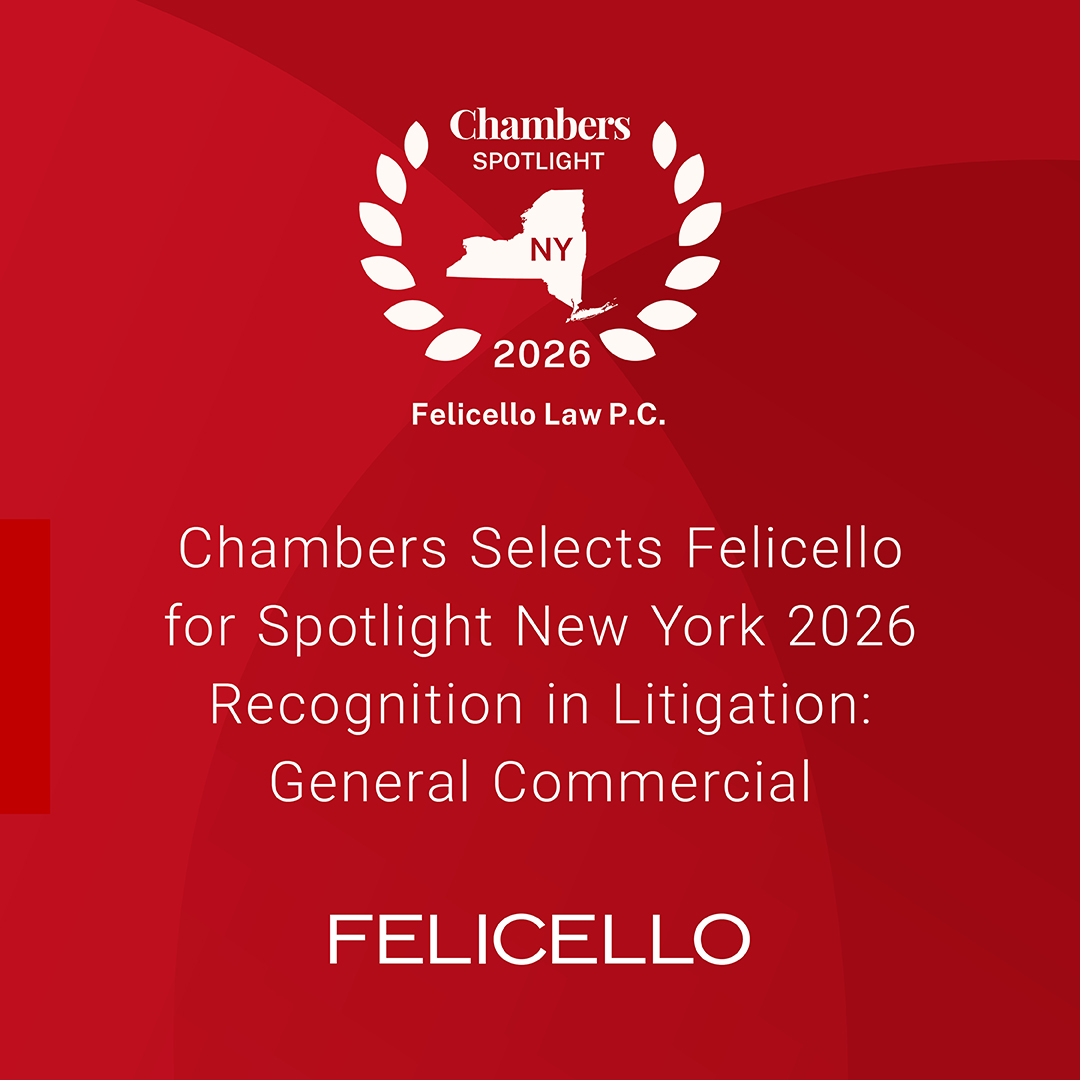Protecting Your Trademark — Is it always good for business?
September 29, 2025

In, "Protecting Your Trademark — Is it always good for business?," (JD Supra, September 29, 2025) Felicello managing partner Rosanne Felicello, along with Subroto Bose, of Astera Labs USA, and Ira Schwartz of Parker Schwartz PLLC discuss lululemon's trademark infringement lawsuit against Costco (lululemon athletica canada inc. v. Costco Wholesale Corporation, 2:25-cv-05864, (C.D. Cal. Jun 27, 2025) ECF No. 1).
To read the full article as a PDF, click here.
Protecting Your Trademark — Is it always good for business?
By Rosanne Felicello, Subroto Bose, and Ira Schwartz
You may have seen the headlines over the summer that lululemon sued Costco for trademark infringement because Costco has been selling clothing that bears a striking resemblance to lululemon clothing. Your first thought might have been to head to Costco to pick up your own wardrobe of the “dupes,” as the kids call them. But your second thought—my second thought anyway—might have been, “Does lululemon have a real trademark to protect? Doesn’t all athleisure look similar? Could the shape or color of my workout work to identify the brand or source of the product?” And my third thought was, if this is the case and Costco had done a great job creating dupes, why on earth would lululemon advertise that its products could be had on the cheap at Costco?
Reading the Complaint answered some, but not all of my questions. Lululemon asserts claims of trade dress and trademark infringement, false designation of origin, passing off & unfair competition under federal law, as well as common law trade dress and trademark infringement and unfair competition under California law and a federal design patent infringement. The gist of lululemon’s complaint is that Costco is selling under its Kirkland brand name clothing that looks very similar to certain well-known products, including lululemon’s SCUBA® hoodies and sweatshirts, DEFINE® jackets, and ABC pants. Lululemon asserts that these three products are distinctive identifiers of lululemon’s “high-quality and high-performance products.”
And the Complaint cites to registrations for some of the trade dress and the names SCUBA® and DEFINE®. It also refers a design patent for one of the articles of clothing. And it includes a claim based on unregistered trade dress. If lululemon can show that its trade dress and word marks act as source identifiers, it may have something worth protecting. After all, the Supreme Court has made clear that words, graphic designs, the overall appearance of a product, and its packaging can all constitute trademarks protected by the Lanham Act. Jack Daniel's Properties, Inc. v VIP Products LLC, 599 US 140, 145 [2023], citing Wal-Mart Stores, Inc. v. Samara Brothers, Inc., 529 U.S. 205, 209–210, 120 S.Ct. 1339, 146 L.Ed.2d 182 (2000)." How a product looks, even a color alone, can be enough to exclude others from making a confusingly similar looking product. " See iQualitex Co. v Jacobson Products Co., Inc., 514 US 159, 160-61 [1995] (holding that a color can be registered as a trademark).
But there are limits to this concept. Leggings are leggings. T-shirts are t-shirts. If they are not distinctive enough to convey lululemon as the source, they are not entitled to protection under the Lanham Act. See Jack Daniel's Properties, Inc. v VIP Products LLC, 599 US 140, 146 [2023] (“[A] trademark is not a trademark unless it identifies a product’s source (this is a Nike) and distinguishes that source from others (not any other sneaker brand”).
Trade dress is also not protectable as a trademark if it is functional. In other words, if the elements claimed as trade dress serve a functional purpose, those elements are not entitled to trademark law protection. In particular, if a design serves a decorative or ornamental purpose on the item, then it does not serve as a source identifier, i.e. as a trademark. Indeed, that issue was already raised by the Trademark Office in connection with lululemon’s trademark filings. While lululemon was able to overcome those objections at the trademark office, those rulings can be (and likely will be) reviewed by the court during the litigation process.
Lululemon focuses on its athleisure that is distinctive its claim for trade dress infringement. Specifically, lululemon points to the distinctive features of its SCUBA and DEFINE trade dress, identifying items such as the shape of the kangaroo pocket on the SCUBA sweatshirts and hoodies as being a source identifier.
In the end, lululemon’s ability to succeed on its trade dress and trademark claims will turn on if it can prove that consumers were actually confused that they were buying lululemon’s products at Costco. This will be a heavier lift, especially given that the products sold at Costco were clearly marked with the Kirkland brand. This fact seems fatal to any claim that the consumer was confused.
It appears, instead, that the consumer was in on the deception, opting with clear eyes to buy the much cheaper dupe. These are not counterfeit goods. They were not stolen from lululemon and resold. They are more likely “knockoffs,” which are generally not unlawful. There is a low likelihood that lululemon will be successful on its trademark claims.
But is it unfair?
But what about the unfair competition claim? Is it unfair to copy another’s design? What is art if not imitation? Under California law, lululemon’s unfair competition claim will likely rise or fall with its trademark claims. Simple Design Ltd. v Enerjoy Ltd., 710 F Supp 3d 817, 823 [CD Cal 2024] (“By proscribing ‘any unlawful’ business practice, [the UCL] borrows violations of other laws and treats them as unlawful practices that the unfair competition law makes independently actionable.”) (citation omitted).
Lululemon’s strongest claim might be its design patents covering designs embodied in lululemon’s SCUBA hoodies and sweatshirts and DEFINE jackets. Presumably, the design patents would not have been granted unless the designs were unique, the but validity of the design patents issued here will likely be tested before the court reaches any infringement analysis. And a court will only find infringement where “the accused article embodies the patented design or any colorable imitation thereof." Tee Turtle, LLC v Kellytoy Worldwide, Inc., 522 F Supp 3d 695, 707 [CD Cal 2021] (citation omitted). If an ordinary observer can tell the designs apart, there is no infringement of the design patent.
Is this lawsuit good for business?
On June 5, 2025 lululemon announced earnings. The next day, lululemon’s stock price plunged. Almost a month later, lululemon brought this lawsuit. It has not helped. And as of September 25, 2025, Lululemon’s stock is hovering around $176.77, down from a high of $335.11 on June 5, 2025. So it hasn’t helped. And there is a risk that the court here could void some of the registrations currently held by lululemon.
The decision by lululemon to bring a lawsuit here is in contrast to the decision made by Hermes in response to a lookalike “Birkin” sold by Wal-Mart. There the company decided that there could be no consumer confusion because the product sold by Wal-Mart was of inferior quality. https://www.businessinsider.com/hermes-ceo-viral-wirkin-walmart-birkin-bag-copies-2025-2
How do you know if you should fight the dupes or turn the other cheek?
It’s not a simple decision. The analysis begins with the likelihood of consumer confusion. If the consumer is not likely to be confused by the competing product, it is unlikely that the court is going to find infringement. Even if there is no likelihood of confusion, however, you might be able to show dilution by tarnishment of a famous mark under the Trademark Dilution Revision Act (TDRA). The TDRA only applies if your mark is considered “famous” and you can show that the other mark is likely to harm the reputation of the famous mark. The remedy under the TDRA is an injunction.
But if you cannot show likelihood of confusion or likelihood of dilution by tarnishment, then heading to court may not only be a waste of time but might lead your actual customers to search out the dupes!
- The lawsuit was brought by lululemon athletica canada inc. and lululemon USA, Inc.
About the Authors:
Rosanne Felicello is the managing partner of Felicello Law PC; Subroto Bose is Head of IP for Astera Labs USA; Ira Schwartz is founding partner of Parker Schwartz PLLC.



